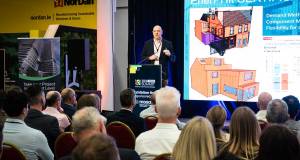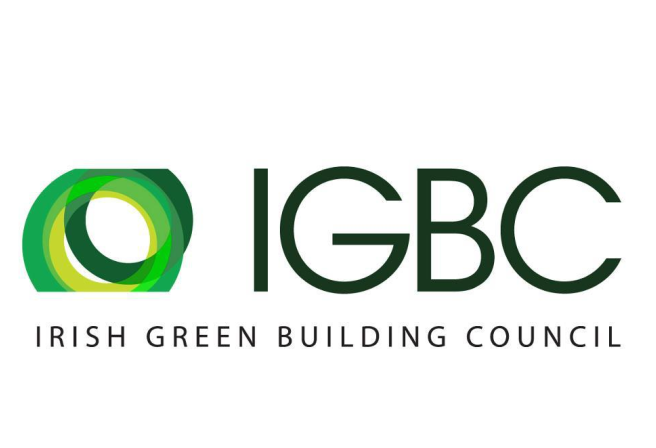- General
- Posted
Ireland joins whole life carbon data initiative
Ireland is to participate in a pioneering European initiative aiming to boost the availability of quality building whole life carbon data, a critical step towards full decarbonisation.
This article was originally published in issue 44 of Passive House Plus magazine. Want immediate access to all back issues and exclusive extra content? Click here to subscribe for as little as €15, or click here to receive the next issue free of charge
The initiative, titled Indicate, will bring together government, industry, and academia to tackle one of the key barriers to decarbonising Ireland's built environment: a lack of reliable and comprehensive whole life carbon emissions data for buildings. Whole life carbon takes account of emissions across a building’s full life cycle, including emissions from operational energy use along with embodied carbon.
Pat Barry, CEO of the Irish Green Building Council (IGBC) said: “In Ireland, embodied carbon emissions associated with the production, transport, construction, maintenance, repair, and disposal of buildings and infrastructure account for 14 per cent of our national emissions. These are likely to increase significantly over the next decade as we build more homes and infrastructure, yet they remain unregulated”.
The EU recently took its own first steps towards whole life carbon regulation with proposals to introduce mandatory reporting for larger buildings by 2027 and all buildings by the end of the decade in the revision of a key piece of European buildings policy, the Energy Performance of Buildings Directive (EPBD). Countries such as Denmark, Finland, France, and the Netherlands, are moving faster and have already regulated embodied carbon emissions. In all these markets, the first crucial step in mandating whole life carbon measurements and reduction was to develop a robust methodology and establish high-quality baselines.
Commenting on the launch of the project, Francis Noel Duffy TD and #BuildingLife Ambassador added: “Addressing embodied carbon emissions is critical to halve our emissions by 2030 and reach carbon neutrality by 2050. The development of high-quality data and baseline data for buildings constructed in Ireland through pilot projects is a key step in supporting the regulation of these emissions in Ireland.”
The Indicate initiative seeks to accelerate this policy development in Ireland, Spain, and Czechia by generating critical baseline data for buildings, which will allow policymakers to set carbon limits that cover the full life cycle impact of buildings, from manufacture and construction through to deconstruction and waste processing – so-called “whole life carbon limits”.
In Ireland, the project will be delivered through Construct Innovate, Ireland's national research centre for construction technology and innovation with core personnel from University of Galway, IGBC and University College Dublin in the project delivery team, supported by the Sustainable Energy Authority of Ireland (SEAI).
Reacting to the launch of the initiative, Joe Durkan, head of technical – national retrofit at SEAI commented: “High-quality data on whole life carbon emissions associated with our built environment is critical to support policymaking and the decarbonisation of our building stock. SEAI recognises the importance of collecting standardised data through the development of a national methodology to assess these emissions and is pleased to support the Indicate project.”
The innovative public-private approach of Indicate aims to secure broad support from industry and policymakers alike, helping to ensure the resulting data is quickly put to use. The project is just the beginning of what the coalition hope will be a Europe-wide programme to finally quantify and drive a quick reduction in unregulated carbon emissions.
The Indicate initiative supports the implementation of the “Building a Zero Carbon Ireland” roadmap launched by the Irish Green Building Council in late 2022. The roadmap sets a clear path to reach net zero by 2050 and highlights the importance of developing a national methodology and a database of building life cycle assessments, leading to benchmarks being set and the introduction of a mandatory whole life carbon disclosure.
Call for embodied carbon case studies Meanwhile, the IGBC is calling for volunteers to prepare case studies assessing the embodied carbon of construction projects using a new national calculation methodology being developed and tested by the IGBC. Funded by SEAI, the new UpfrontCO2 methodology has been developed by the IGBC to enable consistent whole life carbon calculation based on EN 15978 and the EU Level(s) framework for measuring the sustainability of buildings.
“Current case studies are hard to compare with one another as they are assessed using different methodologies,” said IGBC whole life carbon lead Stephen Barrett. “We need a set of consistently assessed case studies so we can better understand the carbon intensity of our different building typologies today.”
Barrett said that in the process, volunteer partners will help to identify and re-think the most impactful decisions or so-called “carbon hotspots”, measure the kinds of differences that can be made, design out waste and design in circularity. In the process volunteers will learn about the future of EU legislation, the use of the whole life carbon calculation methodology, and the balance between operational and embodied carbon, while discussing problems and sharing results in the process Indicate was launched in December 2022 by a European consortium including the Building Performance Institute Europe, the Catholic University Leuven and World Green Building Council, and is coordinated by Danish consultancy, Smith Innovation. It is co-funded by the Laudes Foundation and cash or in-kind contributions from national partners, including national governments.
More information can be found here.
Related items
-
 #BuildingLife Series: Director at CORA Consulting Engineers, John Casey
#BuildingLife Series: Director at CORA Consulting Engineers, John Casey -
 Green homes and finance join forces for growth
Green homes and finance join forces for growth -
 Hotel demolition judicial review could set embodied carbon precedent
Hotel demolition judicial review could set embodied carbon precedent -
 ZEB Summit celebrates Irish passive progress
ZEB Summit celebrates Irish passive progress -
 Irish and British associations unite for conference as passive house explodes
Irish and British associations unite for conference as passive house explodes -
 IGBC launches case studies to drive nature-led construction
IGBC launches case studies to drive nature-led construction


